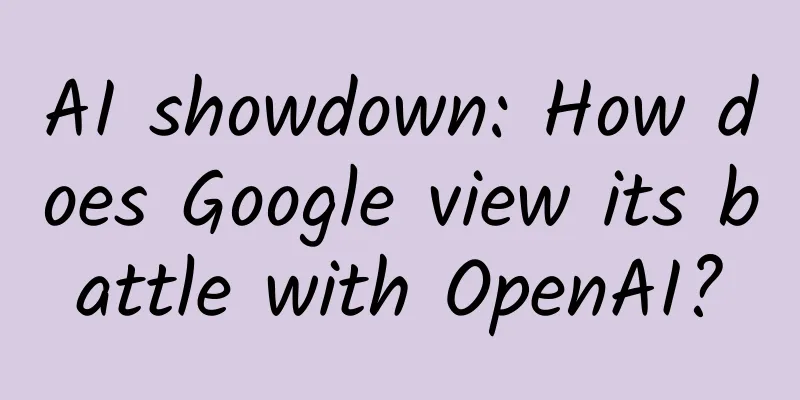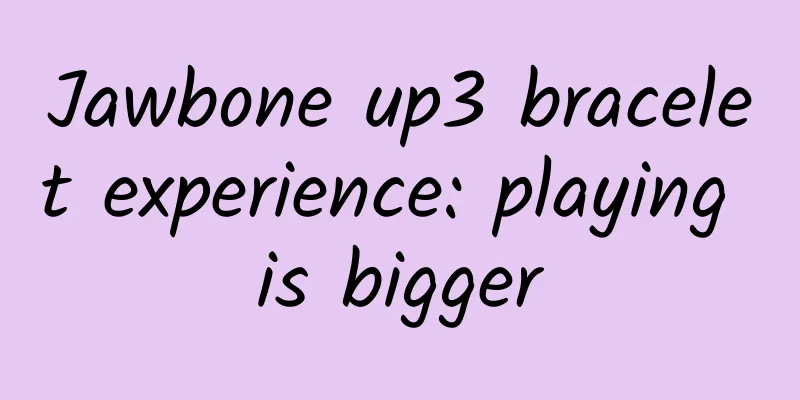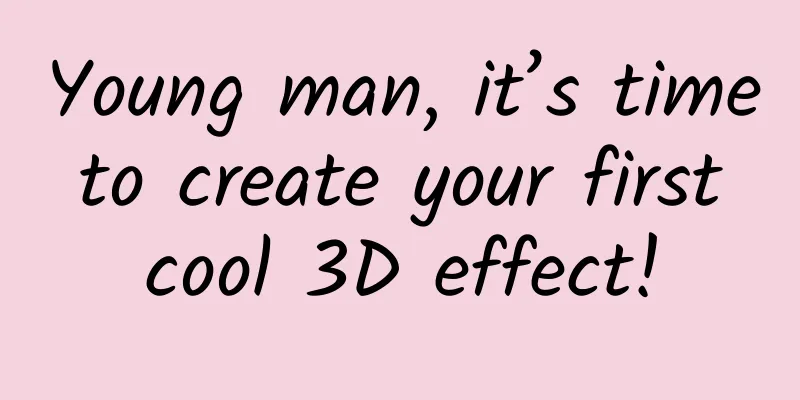AI showdown: How does Google view its battle with OpenAI?

|
[Editor's Note] Google, as a leader in the field of artificial intelligence (AI), has been too rigid and cautious in incorporating AI into its products in the past few years, allowing other companies to seize the initiative. When OpenAI and Microsoft launched consumer-grade large language models, Google was caught off guard and is now scrambling to catch up. Can Google, with more tools and talent, launch a product earlier than OpenAI? Its latest research, Gemini, is positioned as the next generation of large language models. What's special about it? Today, Nvidia's GPU chips are a key component of AI systems. Is this dangerous? What should AI regulation include? How do you view the departure of the Transformers star? Recently, Google CEO Sundar Pichai accepted an interview with the American digital media WIRED and answered the above hotly debated questions in the field of AI . The core points are as follows: ▲Google is thinking about operating large consumer products. Google needs to make the technology more mature before applying it to products. People have a huge trust in Google, and Google will definitely be more cautious before launching technology products. The development curve of technology is long, and Pichai is very satisfied with where Google is now. ▲Today, Google has independent text models and image generation models. With Gemini, these will be integrated. ▲Pichai is very satisfied with the partnership between Google and Nvidia, and said that Google will continue to work closely with them 10 years from now. ▲The first thing to do for AI regulation is to ensure that regulation is a collaboration between the public sector, the private sector, nonprofits, etc. It is important to let innovation flow and ensure that what is designed does not impose a heavy burden on small companies or people who do open source. Then, some preliminary suggestions can be considered. Google should develop industry standards and benchmarks, and it should also consider how to deploy systems. For Pichai, in terms of US regulations, federal privacy legislation should be completed first. ▲AI is one of the most profound technologies that Google will research. There are short-term risks, medium-term risks, and long-term risks. The responsibility now is to test its safety, ensure that it does not compromise privacy and introduce bias. In the medium term, Pichai is worried about whether AI will replace or enhance the labor market. ▲ Pichai said that Google is attracting the best talents in the world every week. Equally important, Google has an open culture. It is undeniable that Google has lost some talents, but Google's talent retention is also better than it has been in a long time. Academic Headlines has made a simple translation without changing the main idea of the original text. The content is as follows: Earlier this month, Sundar Pichai was struggling to write a letter to Alphabet’s 180,000 employees. It would have been easy for the 51-year-old CEO to shower Google with praise on its 25th birthday. Alphabet’s stock market value was about $1.7 trillion; its massive cloud computing business was profitable for the first time; its self-driving cars were ferrying people through the streets of San Francisco; and Google Search remained the king of the field, as it had been at every turn this century, siphoning off nearly 40% of the world’s digital advertising revenue. But not all is well on Alphabet’s vast Mountain View campus. The U.S. government is about to go to trial for abusing its monopoly in search, and the harmonious atmosphere that once permeated Google’s employees has become fragmented. Several high-profile employees have left the company, complaining that the company is moving too slowly. Perhaps most disturbing, Google, long the world leader in AI, has been ruthlessly beaten by an upstart, OpenAI. Google’s longtime rival Microsoft also dealt a heavy blow to Google by building a large language model (LLMs) into its similar search engine Bing, causing panic among employees. Microsoft CEO Satya Nadella once boasted, “I want people to know that we forced Google to change.” On September 5, Pichai published an inspiring letter that almost stunned everyone with its account of the company’s amazing journey. But beneath the cheers, you could detect a hidden theme: “We are more important than ever.” Whatever they say, one thing comes up over and over again: We can’t lose in AI. Pichai joined the company in April 2004, the same month Gmail was launched, and he has been CEO for eight years. He often talks about his upbringing in India, where technology was a lifeline to better times. He is widely regarded as a "nice guy." But he has made some tough decisions over the years, including layoffs, product cancellations and restructurings, such as his recent forced merger of Google's two semi-competing AI research centers, DeepMind and Google Brain. Now, he faces even bigger choices as challenges arise both inside and outside the company. At the same time, he is pursuing what he calls the "biggest technology shift" of his lifetime. Just before publishing his blog post, Pichai spoke with WIRED about AI, battling bureaucracy, and why he rejects the notion that he’s primarily a consensus builder . The interview has been edited for length and clarity. Steven Levy: You just shared an article commemorating Google's 25th anniversary. It's optimistic and inspiring, but do I see the subtext here? You seem to be calling out that Google still exists to benefit the world, even though some people may question that now. Sundar Pichai: This is definitely a time for reflection. 25 years is a long time in the tech world. But I firmly believe that the future will be a golden age of innovation with the shift to AI. As a company, our opportunity is as great as it was 25 years ago, but our responsibility is even greater. I hope the message to the company is that we should strike a balance between being bold and responsible, and that we are excited about this moment. Steven Levy: Okay. But I'm going to share a story you've probably heard: Google has been a leader in AI. In the past few years, even though Google has added AI to its products, it was too rigid or cautious to seize the opportunity, while other companies had already taken the lead. When OpenAI and Microsoft launched consumer-grade LLMs, Google was caught off guard and is now desperately trying to catch up. What's your response to this? Sundar Pichai: You're right, we've been thinking about AI from the beginning. Obviously, when I became CEO in 2015, deep neural networks were thought to be something that was going to profoundly change everything. So I made it a priority to move the company toward AI, and that's where we're investing a lot of our R&D dollars. Internally, we have LLMs like LaMDA. Obviously, we think about running large consumer products. But we definitely think that we need to mature the technology a little bit before we put it into our products. People come to us with a huge sense of trust, and they type into Google, "What is the dosage of Tylenol for a 3-month-old baby?" You can imagine that we have a huge responsibility. So we're definitely more cautious in this regard. So the launch of ChatGPT is a credit to OpenAI, and it shows that there is product-market fit, and people are ready to understand and use this technology. In some ways, this is an exciting time for me because we are building the underlying technology and deploying it in our products. But we are still thinking carefully about what we need to do. The development curve of technology is long, and I feel very good about where we are now. Steven Levy: You had the tools and talent to launch a product like GPT earlier than OpenAI. Looking back now, should you have done so? Sundar Pichai: You can go back and re-examine everything. It's not entirely clear to me now that it will work the same way. The fact is, we can do more after people see how it works. It won't matter in the next five to ten years. What's important is to look at the signal and separate it from the noise. The signal is that AI is a profound platform shift and it's entering a phase where you can deploy it more deeply. We are working on solving real problems with excitement, optimism, and a sense of responsibility. To me, that's the signal. That's the opportunity. Steven Levy: After Microsoft added ChatGPT to the Bing search engine, Google also quickly released its own Bard. Did Nadella make you "dance"? Sundar Pichai: In cricket, there's a saying, "Let the bat do the talking." We're innovating every year in AI and applying AI to search. There's always competition. We've seen it with Alexa and Siri, and that's not new. Around the end of last year, my thought was, how can we bring generative AI to search in a way that makes sense for users? That's what I was thinking about, and that's what's most important in the long run. Steven Levy: I'm glad you mentioned search. The foundation of Google search -- and it's where almost all of your revenue comes from -- is that people query the search engine, then find relevant links and visit them, and maybe spend money there. But your plan to use LLMs in search, SGE (Search Generated Experience), doesn't bring people to the site. You type a query into the Google search bar, and SGE answers it with a long paragraph of text. How do you do that without destroying your business model? Sundar Pichai: First, in search, people are looking for information. The way we present information has changed dramatically over the last many years. But we're still working to help people find the best information that exists on the web. At their core, people are also looking for commercial information, and ads are very valuable commercial information because they connect merchants and businesses, big and small, with users. None of this changes as we apply AI more deeply. We're applying the same principles when we empower search with generative AI. It's very important for us to connect users with content on the web, and we're digging deeper to make sure that continues to work well. Steven Levy: However, if I search for the keyword "LLMs," I get a very different set of results than a list of links. So how do I tell which links are sponsored and which are organic? Sundar Pichai: You'll see the same thing. Even in the generative experience, we're giving you a set of sites that support what we're saying. We want to make sure that users are using those sites. So I think the core part of the experience is not changing. We're going to offer ad space in a way that makes sense for users, especially on commercial queries. Our early testing shows that we can do that. When we moved from desktop search to mobile search, people asked the same question. Evolving search while applying the fundamentals is core to the company. I'm confident that we can do that as we move forward. Steven Levy: For many years, DeepMind and Google Brain operated as separate entities, perhaps even competing entities. This year, you merged them. Why? And have you seen the fruits of the merger? Sundar Pichai: I've always felt lucky that we have two of the best AI teams in the world. They focus on different problems, but they collaborate more than people know. Google worked very hard to make sure we had TPUs (tensor processing units, which are optimized for machine learning) to power AlphaGo (the program that beat the world champion at the complex game of Go). We realized that we needed to build larger LLMs, so it made sense for us to join forces so that we could use computing resources more efficiently. Gemini is really a product of the collaboration between these two teams. And Jeff Dean, the leader of Google Brain, wanted to get back into the role of deep engineering and science. I worked for a while on the teams in the UK and Mountain View, and I was very excited when I walked through the hall and saw the Gemini team working closely with Google Search. I felt a sense of excitement that reminded me of the early days of Google . Steven Levy: The winner of this merger for LLMs seems to be DeepMind's Gemini, which you're positioning as the next generation of LLMs. What can it do that the current generation can't? Sundar Pichai: Today, we have separate text models and image generation models, etc. With Gemini, these will be integrated. Steven Levy: Meanwhile, we haven't heard much about Google Assistant. Should we be sounding the "missing person" alert? Sundar Pichai: We built the conversational LLM LaMDA in part because we realized we needed to improve the underlying technology of Google Assistant. AI will make Google Assistant fundamentally better. Steven Levy: The U.S. government is trying Google for antitrust violations and alleging that it has a monopoly in search. You might disagree with that. So how would you describe the company's dominance in search? Sundar Pichai: This is happening at a time of unprecedented innovation. If you step back and look at the recent breakthroughs in AI, new applications, and the choices people have for getting information. We make thousands of changes every year to improve search. We invest billions of dollars to continually innovate and make sure the product serves people well, and that it's a product that people want to use. I'm excited about the opportunity to shine a light on that. It's an important process. Steven Levy: So what you're saying is that we should look at this in a broader sense than just market share? Sundar Pichai: Think about all the ways people get information today. It's a very dynamic space and it's a vast space. We have to work hard and keep innovating to stay ahead. Steven Levy: If you can't be the default search engine on third-party browsers and phones - which the government is opposing - what impact will that have on Google? Sundar Pichai: We want to make it easier for users to access our services. This is very beneficial to consumers. Steven Levy: Just now you mentioned your internal AI chip. Google Cloud Enterprise Services recently announced its first profit, and now a big part of cloud services is to support AI. I found it interesting that you have a huge partnership with Nvidia, whose GPU chips seem to be a key component, even an irreplaceable component, of the AI ecosystem. How important is it for you to maintain a good relationship with Nvidia? Do you think it is dangerous for one company to have so much power? Sundar Pichai: We have a long-term partnership with NVIDIA for more than a decade, including deep collaboration on Android. Obviously, in AI, they have clearly demonstrated strong innovation. Many of our cloud computing customers are also NVIDIA customers. So collaboration is very, very critical. The semiconductor industry is a dynamic and collaborative industry. It is an industry that requires deep, long-term R&D and investment. I am very happy with our partnership with NVIDIA, and we will continue to work closely with them 10 years from now . Steven Levy: You, and many in the industry, have said they welcome AI regulation. What do you think that regulation should include? Which regulations will stifle innovation and hinder the benefits of the technology? Sundar Pichai: I think the first thing to do is to make sure that regulation is a collaboration between the public sector, the private sector, nonprofits, and so on. It's important to let innovation flow and make sure that what you design is not a heavy burden on small companies or people who do open source. Then, some initial recommendations can be considered, like, how do you test cutting-edge models? What does security testing look like? We should develop industry standards and benchmarks. Also, think about how systems are deployed. Obviously, they will be deployed in all kinds of scenarios, from recommending nearby coffee shops to deciding what insurance people should buy, or making medical decisions. So it's obviously reasonable to test them for security, to avoid bias, and to protect privacy. But I would balance that by asking whether existing regulations cover this. For example, using AI in healthcare does not change the fact that you have to go through a regulatory process, including getting approval from the U.S. Food and Drug Administration to do a lot of things. To me, in terms of U.S. regulation, we should actually get federal privacy legislation done first. AI is much riskier in terms of privacy. Steven Levy: Well, I support you in getting strong privacy regulations in Congress. Sundar Pichai: Yes, we have made the call and there will definitely be good results. Steven Levy: We’re discussing AI in very specific ways, but a lot of the discussion is focused on whether it’s ultimately a utopian boon or the end of humanity. What’s your stance on these long-term questions? Sundar Pichai: AI is one of the most profound technologies we're going to work on. There are short-term risks, medium-term risks, and long-term risks. It's important to take all of these issues seriously, but you have to balance the investment of resources based on the stage you're in. In the near term, the most advanced LLMs have hallucination problems - they make up nonsense. This is appropriate in some areas, such as creatively naming your dog, but not "What is the correct dosage of medicine for a 3-year-old?". So the responsibility now is to test its safety, make sure it doesn't compromise privacy and introduce bias. In the medium term, my concern is whether AI will replace or enhance the labor market. In some areas, it will be a disruptive force. There are also long-term risks in developing powerful intelligent agents. How do we ensure that they are consistent with human values? How do we control them? In my opinion, these are all reasonable concerns. Steven Levy: Have you seen the movie Oppenheimer? Sundar Pichai: I’m actually reading the book right now. I’m a big fan of reading the book first and then watching the movie. Steven Levy: I ask this because you are one of the people who have had the greatest impact on this powerful and potentially dangerous technology. Does the Oppenheimer story have that impact on you? Sundar Pichai: All of us who are working on powerful technologies in one way or another — not just AI, but also genetics like Crispr — have to be responsible. You have to make sure you’re an important part of the debate over these things. And obviously, you learn from history as much as you can. Steven Levy: Google is a huge company. Current and former employees complain that bureaucracy and caution slow them down. In your letter, you cite the influential "Transformers" paper, whose eight authors have all left the company, and some of them think Google is moving too slowly. Can you mitigate that and make Google more like a startup again? Sundar Pichai: Any time you're scaling a company, you have to make sure that you're working to reduce bureaucracy and stay as lean and nimble as possible. In a lot of areas, we're moving very quickly. Our growth in cloud would not have happened if we hadn't scaled very quickly. I look at the work that the YouTube Shorts team is doing, I look at the work that the Pixel team is doing, I look at what the Search team is doing in AI. In a lot of areas, we're moving very quickly. Steven Levy: Yet we hear these complaints, including from people who loved the company but left. Sundar Pichai: Obviously, when you're running a large company, sometimes you look around and say, in some ways, maybe you're not moving as fast, and then you work to fix it. Do I hire candidates who come to join us because they feel like they've worked at other large companies where it was very, very bureaucratic and they couldn't make changes as quickly as they could at other companies? Absolutely. Are we attracting the best talent in the world every week? Yes. And just as importantly, we have an open culture - people say a lot about the company. Yes, we lose some talent. But we're also retaining talent better than we've been in a long time. Did OpenAI lose some people from the original GPT team? The answer is yes. You know, I actually feel like the company is moving faster in some areas than I remember 10 years ago. Steven Levy: You've been CEO for eight years, and the pressure has never been greater. You've always been known for building consensus, but now it seems like a "wartime CEO" is needed. Does this role resonate with you? Sundar Pichai: I've always thought that we work in a dynamic technology space. So the idea of peacetime/wartime doesn't really resonate with me. In a given week, you can have both moments. A lot of the decisions I've made over the years have not been about consensus. There's a difference between making clear decisions and getting people to buy into them. What I've done this year is no different than what I've done over the years. I always take the long view. I never lose sight of what Google's strengths are. Google is a company with deep technology, computer science, and AI that we apply to build great products that make a difference for people. We're more diverse now. That's not going to change over time. Steven Levy: Three years ago, I asked you if Google was still "Googly," and you said it was. As the company continues to grow and age, what can you do to keep it "Googly"? Sundar Pichai: Googly is about staying true to our values and making sure that we strive to innovate using deep computer science and build products that are truly important to people's daily lives. As long as we keep that in mind, I think we will be successful. Steven Levy: In your 25th anniversary letter, you reflected on your roots growing up in India, when technology was a luxury. Today, you are the CEO of a trillion-dollar company and you are making a fortune. How do you stay connected to your first step into the U.S.? Sundar Pichai: In my personal experience, access to technology is a big driver of opportunity. I've seen it in my own life, and I've seen it in the lives of countless others. What inspired me to join and be a part of Google was the mission statement of Google, which is to make useful information universally accessible. With AI, it's even more imperative that more people understand one of the most profound technologies we work on. So I feel a deep need to make sure that we develop this technology in a way that can benefit the world. Personally, when I was in India, every weekend I would spend time with my parents, and my mom would make my favorite food - Dosas, South Indian crepes. I make it almost every Saturday morning now. My mom makes it for me. I keep things very simple. Original author: Steven Levy Original link: https://www.wired.com/story/sundar-pichai-google-ai-microsoft-openai/ Compiled by: Hazel Yan |
Recommend
A lone brave man in the deep mountains and valleys - The Ancient Tea-Horse Road
A lone brave man in the deep mountains and valley...
Mercedes-Benz shows off its all-electric truck, which is impressive but has a range of only 200 km
In July this year, Daimler released the latest Me...
VR will enter an 18-month battle period. How should startups respond?
February 19th news, if you are one of the virtual...
Can you wear your watch while swimming? It all depends on the protection level
Can IP68 mobile phones really be used in any envi...
iPhone 6: Driving Taiwan's continued economic growth
The launch of new technology products such as App...
Understanding Android naming conventions
Recently I have been answering questions from stu...
Introducing the Android Emulator for Visual Studio
Microsoft released a preview of Visual Studio 201...
Why is Bluetooth called "Blue"? Can't it be called "White"?
As a fashionable and technological youth, there a...
Tool Inventory | One-click query of information flow advertising materials
Are you still using Baidu to search for informati...
How to promote Juliang Qianchuan and what is the promotion effect of Juliang Qianchuan?
With the launch of the massive Qianchuan platform...
Apple's "soft power" is its biggest killer
[[136826]] Before WWDC, public opinion predicted ...
APICloud launches the "100 million yuan profit sharing plan", and the API ecosystem realizes the full integration of mobile development technologies
【Quick reading, article summary】 As a leading API...
The lethal ingredient in Kobayashi Pharmaceutical's red yeast rice may be "penicillic acid". What exactly is it?
Recently, Kobayashi Pharmaceutical, a well-known ...
Uber burns too much money in China, investors call for peace with Didi
Investors in ride-hailing service Uber have a mes...
APP message push strategy and content copywriting!
I am very happy that you clicked into my article ...









